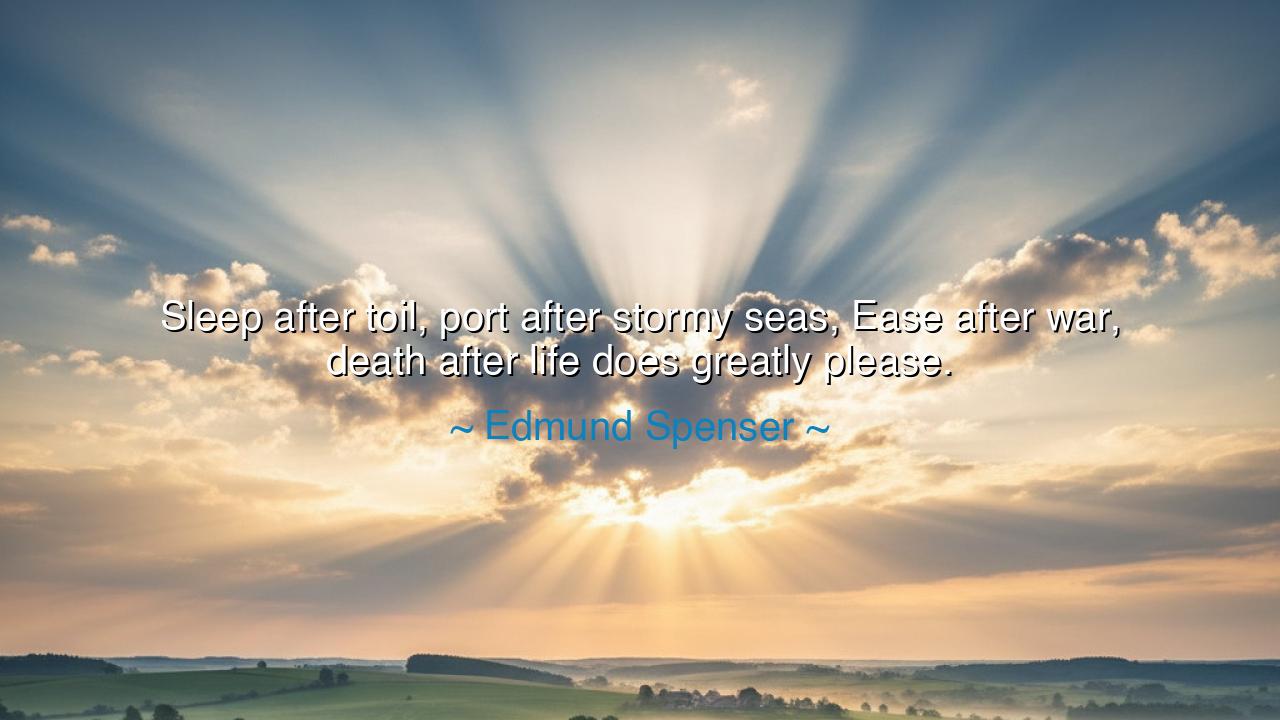
Sleep after toil, port after stormy seas, Ease after war, death
Sleep after toil, port after stormy seas, Ease after war, death after life does greatly please.






Edmund Spenser wrote in his The Faerie Queene: “Sleep after toil, port after stormy seas, ease after war, death after life does greatly please.” These words, carved from the heart of the English Renaissance, speak with the quiet strength of ancient wisdom. They remind us that rest, peace, and finality are not to be feared, but to be honored as the rightful companions of struggle. Spenser, a poet of noble spirit and lofty vision, knew that the beauty of life lies not in its unbroken joy, but in the harmony between labor and rest, between storm and calm, between life and the peace that follows it.
In these lines, Spenser likens death to sleep, to harbor, to ease — not as a grim annihilation, but as the final gift to the weary traveler. Just as the sailor rejoices upon sighting the port after a raging sea, so too does the soul, having endured the tempests of existence, find deep satisfaction in its eternal rest. Each metaphor unfolds with quiet power: sleep after toil, port after storm, ease after war — and at last, death after life. The rhythm of the line itself mimics the very motion of the human journey — from striving, to enduring, to surrendering in peace.
The ancients often spoke of life as a voyage, and death as the safe harbor at the end. The Greeks imagined the souls of heroes sailing to the Elysian Fields, where no wind howled and no waves broke. So too did the Stoics teach that one should labor nobly through hardship, for the peace that follows is not punishment, but fulfillment. Spenser’s vision springs from the same well — that death, far from being the enemy, is the completion of the human story, the quiet turning of the final page after the drama of the day.
Consider the story of Nelson Mandela, who spent twenty-seven years in imprisonment, his spirit tested by cruelty and isolation. Yet when freedom came, he did not speak of vengeance but of peace. His struggle had been long and bitter, but he understood, as Spenser did, that true joy is born from contrast. Ease after war is sweet because the soul remembers the battle. The port pleases the sailor because he has felt the storm’s fury. Likewise, Mandela’s forgiveness was a rest after toil, a harbor after tempest — the human spirit finding its rightful calm after years of turmoil. His life teaches that the beauty of rest comes only through endurance.
And so it is with death. Spenser’s wisdom is not morbid; it is compassionate. He does not call us to seek death, but to accept it as a natural peace when it arrives. For those who have lived fully, who have labored, loved, and suffered, death is not an interruption but a homecoming. The weary farmer rests after the harvest; the warrior lays down his sword when the battle is done. The soul, having played its part, seeks the great stillness where it may dwell in quiet joy.
Yet in these words there is also a command for the living. For rest has no sweetness to those who have never toiled, and peace has no meaning for those who have never struggled. If one seeks a pleasing end, one must first embrace a worthy life — filled with purpose, work, and the courage to face the storms that rise. Only the one who has truly lived can rest truly. Ease after war must be earned, not bestowed. To spend one’s years in idleness is to rob death of its dignity and rest of its reward.
Therefore, take this teaching as your own: labor well, endure bravely, love deeply, and do not shrink from the storms of life. Every hardship you meet, every battle you fight, prepares you for the sweetness of peace. Seek not an easy life, but a meaningful one, and when rest comes — whether in sleep or in the final quiet of death — it will come as a friend. Spenser’s words call us to live heroically and to die serenely, knowing that all things, from toil to triumph, are but movements in the great harmony of existence.
For in the end, the poet’s truth remains eternal: sleep after toil, port after storm, ease after war, death after life — all these greatly please. They are not endings, but fulfillments. They are the soul’s gentle return to balance, the music’s last, perfect note after the symphony’s crescendo. And when that final rest comes, it will not be sorrow but peace — the deep, quiet peace that belongs to all who have lived, struggled, and at last, come home.






AAdministratorAdministrator
Welcome, honored guests. Please leave a comment, we will respond soon